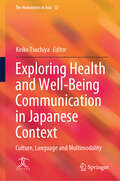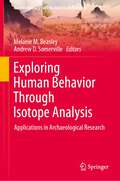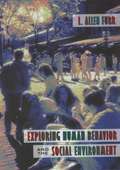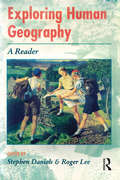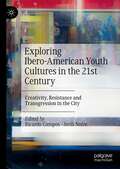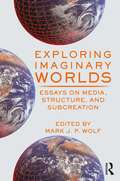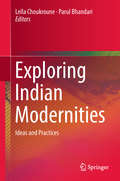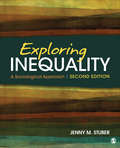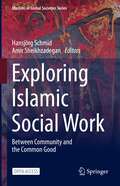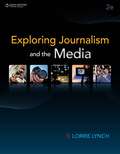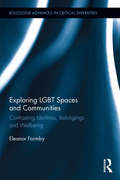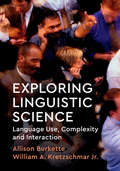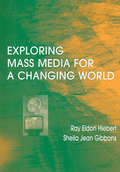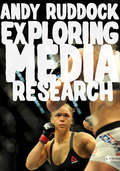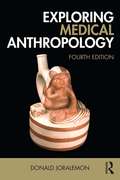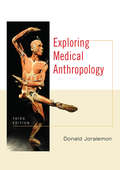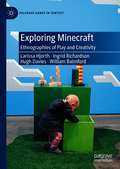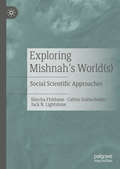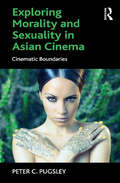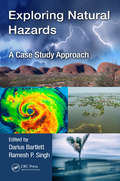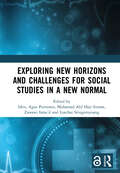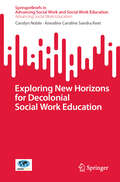- Table View
- List View
Exploring Health and Well-Being Communication in Japanese Context: Culture, Language and Multimodality (The Humanities in Asia #12)
by Keiko TsuchiyaThis book is a selection of linguistic and multimodal research on healthcare and well-being communication in Japan. This volume offers unique perspectives to the field of healthcare communication research, where studies in the West is still dominant, providing a missing piece of the whole picture. Multiculturality and multimodality in interactions in healthcare and well-being are the themes in this volume. Culture here is not limited to ethnic groups, including any sociocultural groups from different professional disciplines to atypical individuals. Two research principles are addressed: (1) multiculturality: how are inter/cross-cultural encounters or issues among different sociocultural groups addressed, and what practices are embodied in a particular sociocultural setting?, and (2) multimodality: what semiotic resources are included in the analysis, how are those data collected and transcribed? The first chapter (Tsuchiya) provides a concise overview of healthcare communication research in Japan and Europe, introducing the themes and chapters in this volume. The introductory chapter is followed by case studies in a range of research fields in healthcare and well-being in Japan: Chapter 2 (Aizaki) employs a discourse analytic approach to examine framing in a first-encounter interaction among a Japanese adult with ASD and other three non-ASD Japanese adults. The context of Nukuto's ethnographic discourse research (Chapter 3) was set in a classroom at a Japanese university, where a special education teacher was teaching crafting (monodukuri) to prospective teachers, highlighting materials as a communicative medium for grounding. Chapter 4 (Sekine, Takashima, Oka, Yano, and Suzuki) investigates how Deaf children who use Japanese Sign Language adjust their expressions of a special location in interactions with those in different age groups. Chapter 5 (Yohena) analyses discourses in Christian coaching between an American coach and a Japanese client from a cross-cultural perspective. The last two chapters are studies in hospital. Kuroshima's conversation analytic research (Chapter 6) provides a detailed description of doctors' use of patient's medical records during consultations. Chapter 7 (Tsuchiya, Nakamura and Coffey) captures a moment when a trauma team leader rejects a member's proposal in simulation in the UK and Japan. The concluding chapter (Chapter 8, Tsuchiya) recapitulates themes, theories and methods which the chapter authors employed in the previous chapters, encouraging publications in health and well-being communication research in Asia and beyond.
Exploring Human Behavior Through Isotope Analysis: Applications in Archaeological Research (Interdisciplinary Contributions to Archaeology)
by Melanie M. Beasley Andrew D. SomervilleThis edited volume compiles a series of chapters written by experts of isotopic analysis in order to highlight the utility of various isotope systems in the reconstruction of past human behaviors. Rather than grouping contributions by specific isotopes or analytical techniques, as many isotope review articles are arranged, the volume organizes chapters by broadly defined themes of archaeological research. These include: paleodiet and life histories, human-animal interactions, and migration and mobility. In this sense, the book is arranged with the intent of being as much question based as method based. Chapters under these themes provide background information on the principles of the techniques and on the theoretical underpinnings of the research; yet they are written with the non-specialist in mind and attempt to convey these ideas clearly and succinctly. In addition to the case studies and reviews, three chapters provide greater context to the field of isotopic archaeology, discussing its history, basic principles, and future potential. The volume aims to serve as a reference source for students and practicing archaeologists seeking to apply isotopic studies to their own research projects or to act as a reader for courses in archaeological science. Chapter 6 is available open access under a Creative Commons Attribution 4.0 International License via link.springer.com.
Exploring Human Behavior and the Social Environment
by L. Allen FurrIndividuals' behaviors are a function of their interactions with the bio-psycho-social contexts in which they are situated. Consequently, in this book considerable attention is paid to the various aspects of those environments. Topics such as the effects of social class and community on behavior are given considerable attention. How individuals and groups relate to political and economic systems and bureaucracies are important themes as well.
Exploring Human Geography: A Reader (Arnold Readers in Geography)
by Roger Lee Stephen DanielsA lively and stimulating resource for all first year students of human geography, this introductory Reader comprises key published writings from the main fields of human geography. Because the subject is both broad and necessarily only loosely defined, a principal aim of this book is to present a view of the subject which is theoretically informed and yet recognises that any view is partial, contingent and subject to change.The extracts selected are accessible and raise issues of method and theory as well as fact. The editors have chosen articles that not only represent main currents in the present flow of academic geography but which are also responsive to developments outside of the discipline. Their selection contains a mixture of established and recent writings and each section features a contextualizing introduction and detailed suggestions for further reading.
Exploring Ibero-American Youth Cultures in the 21st Century: Creativity, Resistance and Transgression in the City
by Ricardo Campos Jordi NofreThe authors collected here address youth street cultures in different cities from the Ibero-American world, bringing together contributions on Brazil, Argentina, Mexico, Chile, Portugal, Spain, and beyond. This overseas approach bridging the European and American contexts is justified by the range of (complex) social, cultural and economic relationships that have shaped this transnational geographical space since the beginning of the colonial period. The chapters collected here focus on three key concepts—creativity, resistance and transgression—that form a threefold dispositive to locally and globally confront, contest and even fight against the hegemonic, punitive and oppressive powers (re)produced by (white, male) dominant classes of the city. The book ensures a high diversity of geographical and social/cultural research contexts by focusing on one, two or multiple spatial contexts (the public space, the street, the city) and, at the same time, by emphasizing the different economic, social, cultural, symbolic specificities of youth cultures (including gender, sexuality and race) in their particular urban contexts.
Exploring Imaginary Worlds: Essays on Media, Structure, and Subcreation
by Mark J. P. WolfFrom The Brothers Karamazov to Star Trek to Twin Peaks, this collection explores a variety of different imaginary worlds both historic and contemporary. Featuring contributions from an interdisciplinary and international group of scholars, each essay looks at a particular imaginary world in-depth, and world-building issues associated with that world. Together, the essays explore the relationship between the worlds and the media in which they appear as they examine imaginary worlds in literature, television, film, computer games, and theatre, with many existing across multiple media simultaneously. The book argues that the media incarnation of a world affects world structure and poses unique obstacles to the act of world-building. The worlds discussed include Nazar, Barsetshire, Skotopogonievsk, the Vorkosigan Universe, Grover’s Corners, Gormenghast, Collinsport, Daventry, Dune, the Death Gate Cycle universe, Twin Peaks, and the Star Trek galaxy. A follow-up to Mark J. P. Wolf ’s field-defining book Building Imaginary Worlds, this collection will be of critical interest to students and scholars of popular culture, subcreation studies, transmedia studies, literature, and beyond.
Exploring Indian Modernities: Ideas and Practices
by Leïla Choukroune Parul BhandariThis book analyses how multiple and hybrid ‘modernities’ have been shaped in colonial and postcolonial India from the lens of sociology and anthropology, literature, media and cultural studies, law and political economy. It discusses the ideas that shaped these modernities as well as the lived experience and practice of these modernities. The two broad foci in this book are: (a) The dynamism of modern institutions in India, delineating the specific ways in which ideas of modernity have come to define these institutions and how institutional innovations have shaped modernities; and (b) perspectives on everyday practices of modernities and the cultural constituents of being modern. This book provides an enriching read by bringing together original papers from diverse disciplines and from renowned as well as upcoming scholars.
Exploring Inequality: A Sociological Approach
by Jenny Marie StuberNow Published by SAGE! In Exploring Inequality: A Sociological Approach, author Jenny M. Stuber examines the socially constructed nature of our identities, the processes by which we acquire them, prejudice and privilege, and the unequal outcomes they produce within institutions. By employing both micro-level and macro-level perspectives, as well as integrating intersectional analysis in every chapter, this text provides a solid and effective framework for understanding social diversity and inequality. The updated Second Edition features a strong introductory chapter reviewing key theories and concepts, real-world examples, social problems and their solutions, and better visuals to help students gain a comprehensive understanding of social inequality. Included with this text The online resources for your text are available via the password-protected Instructor Resource Site.
Exploring Inequality: A Sociological Approach
by Jenny Marie StuberNow Published by SAGE! In Exploring Inequality: A Sociological Approach, author Jenny M. Stuber examines the socially constructed nature of our identities, the processes by which we acquire them, prejudice and privilege, and the unequal outcomes they produce within institutions. By employing both micro-level and macro-level perspectives, as well as integrating intersectional analysis in every chapter, this text provides a solid and effective framework for understanding social diversity and inequality. The updated Second Edition features a strong introductory chapter reviewing key theories and concepts, real-world examples, social problems and their solutions, and better visuals to help students gain a comprehensive understanding of social inequality. Included with this text The online resources for your text are available via the password-protected Instructor Resource Site.
Exploring Islamic Social Work: Between Community and the Common Good (Muslims in Global Societies Series #9)
by Hansjörg Schmid Amir SheikhzadeganThis open access book addresses, for the first time, Islamic social work as an emerging concept at the interface of Islamic thought and social sciences. Applying a multidisciplinary approach it explores, on the one hand, the discourse that provides religious legitimisation to social work activities and, on the other hand, case studies of practical fields of Islamic social work including educational programmes, family counselling, and resettlement of prisoners. Although in many cases, these activities are oriented towards Muslim clients, more often than not they go beyond the boundaries of Muslim communities to benefit society as a whole. Muslim actors are also starting to professionalise their services and to negotiate the ways in which they can become fully recognised service-providers within the welfare state. At a more general level, the volume also shows that in contrast to the widespread processes of secularisation of social work and its separation from religious communities, new types of activities are now emerging, which bring back to the public arena both an increased sensitivity to the religious identities of the beneficiaries and the religious motivations of the benefactors. The edited volume will be of interest to researchers in Islamic Studies, Social and Political Sciences, Social Work, and Religious Studies.This is an open access book.
Exploring Journalism and the Media
by Lorrie LynchIntroduce your students to the exciting world of journalism using the hands-on, relevant approach of EXPLORING JOURNALISM AND THE MEDIA, 2e. The instructional model presents timeless concepts and applications that will prepare students for scholastic journalism, as well as lay the ground work for future classes, jobs, and careers. Author Lorrie Lynch's experience as a USA Today journalist gives a unique perspective absent from most other journalism textbooks. Profiles of real journalists, authentic student writings from scholastic publications, 21st Century Career Skills, and discussion on legal issues and editorial ethics will help students connect to the curriculum. EXPLORING JOURNALISM AND THE MEDIA, 2e will not only introduce students to the many different journalism career opportunities, but will also help them perform better in the classroom by providing academic connections, grammar tips, critical thinking activities, and writing activities.
Exploring Journalism and the Media
by Lorrie LynchIntroduce your students to the exciting world of journalism using the hands-on, relevant approach of EXPLORING JOURNALISM AND THE MEDIA, 2e. The instructional model presents timeless concepts and applications that will prepare students for scholastic journalism, as well as lay the ground work for future classes, jobs, and careers. Author Lorrie Lynch's experience as a USA Today journalist gives a unique perspective absent from most other journalism textbooks. Profiles of real journalists, authentic student writings from scholastic publications, 21st Century Career Skills, and discussion on legal issues and editorial ethics will help students connect to the curriculum. EXPLORING JOURNALISM AND THE MEDIA, 2e will not only introduce students to the many different journalism career opportunities, but will also help them perform better in the classroom by providing academic connections, grammar tips, critical thinking activities, and writing activities.
Exploring LGBT Spaces and Communities: Contrasting Identities, Belongings and Wellbeing (Routledge Advances in Critical Diversities)
by Eleanor FormbyThe phrase ‘LGBT community’ is often used by policy-makers, service providers, and lesbian, gay, bisexual and trans (LGBT) people themselves, but what does it mean? What understandings and experiences does that term suggest, and ignore? Based on a UK-wide study funded by the Arts and Humanities Research Council, this book explores these questions from the perspectives of over 600 research participants. Examining ideas about community ‘ownership’; ‘difference’ and diversity; relational practices within and beyond physical spaces; imagined communities and belongings; the importance of ‘ritual’ spaces and symbols, and consequences for wellbeing, the book foregrounds the lived experience of LGBT people to offer a broad analysis of commonalities and divergences in relation to LGBT identities. Drawing on an interdisciplinary perspective grounded in international social science research, the book will appeal to students and scholars with interests in sexual and/or gender identities in the fields of community studies, cultural studies, gender studies, geography, leisure studies, politics, psychology, sexuality studies, social policy, social work, socio-legal studies, and sociology. The book also offers implications for practice, suitable for policy-maker, practitioner, and activist audiences, as well as those with a more personal interest.
Exploring Linguistic Science: Language Use, Complexity, and Interaction
by Allison Burkette William KretzschmarExploring Linguistic Science introduces students to the basic principles of complexity theory and then applies these principles to the scientific study of language.<P><P> It demonstrates how, at every level of linguistic study, we find evidence of language as a complex system. Designed for undergraduate courses in language and linguistics, this essential textbook brings cutting-edge concepts to bear on the traditional components of general introductions to the study of language, such as phonetics, morphology and grammar. The authors maintain a narrative thread throughout the book of 'interaction and emergence', both of which are key terms from the study of complex systems, a new science currently useful in physics, genetics, evolutionary biology, and economics, but also a perfect fit for the humanities. The application of complexity to language highlights the fact that language is an ever-changing, ever-varied product of human behavior.
Exploring Mass Media for A Changing World: Instructor's Manual: Cases For Reflection And Action
by Ray A Hiebert Sheila GibbonsBeautifully written and class tested, Exploring Mass Media for a Changing World provides a comprehensive but modestly priced text around which instructors can develop a customized teaching package. Written for introductory courses, it covers essential information students need in order to understand the media, the mass communication process, and the role of media in society. It summarizes basic, generally agreed-upon principles, theories, significant historical events, and essential facts, but does so in a tightly written, readable style. Taken together, this information can be thought of as a minimum repertoire that all citizens of the "information age" need in order to become literate consumers and users of mass communication. Features include: *Historical Framework--For ease of comprehension, media processes and individual media are placed in historical context to show their technological evolution and the effects of those changes on society. *Organization--The first seven chapters deal with the evolution of communication theories and processes common to all media. The next five deal with specific media in the chronological order in which they became mass media. Chapters 13 and 14 introduce two non-media institutions (advertising and public relations) whose exploration is essential in order to understand how mass media functions in our society. Finally, chapter 15 returns to the theme of technological evolution and its effects on society with an in-depth discussion of the internet. *Flexibility--Because it is concise, affordable, and comprehensive, it can be used either as a stand-alone text in mass media courses or as part of an instructional package in courses where mass communication is one of several major units. *Themes--The following themes are introduced early and carried throughout: (a) the evolution of media technology and its effects on society, (b) the global and culture-bound characteristics of mass media, and (c) the need for media literacy in the 21st century. *Supplements--An accompanying instructor's manual begins with a chapter-length essay on teaching the mass media course then offers the following items for each chapter: topical outline and key vocabulary; key ideas to be emphasized and pitfalls to be avoided; discussion questions; objective and essay test items; and both print and nonprint resources for further study.
Exploring Media Research: Theories, Practice, and Purpose
by Dr Andy RuddockFrom Donald Trump’s use of Twitter, to social media mourning, to cyber-bullying: the evidence of media influence today is all around us. As such, good media research is more important than ever, and crucially, is something all students can and should do. Exploring Media Research is an eye-opening exploration of what it means to understand and do media research today. Carefully balancing theory and practice, Andy Ruddock demystifies the process, showing you don’t need huge amounts of time or money to do meaningful media analysis. The book: Introduces students to the scope and seriousness of media influence Shows them how to tie their own interests to academic concepts and research issues Explains how to use this understanding to develop proper research questions Translates key theoretical concepts into actual research methods students can use to explore the media texts, events, markets and professionals that interest them. Bringing theory to life throughout with a range of contemporary case studies, Exploring Media Research is a thoughtful and practical guide to gathering and analysing media data. It is essential reading for students of media, communication and cultural studies.
Exploring Media Research: Theories, Practice, and Purpose
by Dr Andy RuddockFrom Donald Trump’s use of Twitter, to social media mourning, to cyber-bullying: the evidence of media influence today is all around us. As such, good media research is more important than ever, and crucially, is something all students can and should do. Exploring Media Research is an eye-opening exploration of what it means to understand and do media research today. Carefully balancing theory and practice, Andy Ruddock demystifies the process, showing you don’t need huge amounts of time or money to do meaningful media analysis. The book: Introduces students to the scope and seriousness of media influence Shows them how to tie their own interests to academic concepts and research issues Explains how to use this understanding to develop proper research questions Translates key theoretical concepts into actual research methods students can use to explore the media texts, events, markets and professionals that interest them. Bringing theory to life throughout with a range of contemporary case studies, Exploring Media Research is a thoughtful and practical guide to gathering and analysing media data. It is essential reading for students of media, communication and cultural studies.
Exploring Medical Anthropology
by Donald JoralemonNow in its fourth edition, Exploring Medical Anthropology provides a concise and engaging introduction to medical anthropology. It presents competing theoretical perspectives in a balanced fashion, highlighting points of conflict and convergence. Concrete examples and the author’s personal research experiences are utilized to explain some of the discipline’s most important insights, such as that biology and culture matter equally in the human experience of disease and that medical anthropology can help to alleviate human suffering. The text has been thoroughly updated for the fourth edition, including fresh case studies and a new chapter on drugs. It contains a range of pedagogical features to support teaching and learning, including images, text boxes, a glossary, and suggested further reading.
Exploring Medical Anthropology
by Donald JoralemonThis widely adopted text is a concise and engaging introduction to the field that presents competing theoretical perspectives in a balanced fashion, highlighting points of conflict and convergence. Written in an accessible, jargon-free language, Exploring Medical Anthropology’s concise length leaves room for instructors to supplement it with monographs of their own choosing. Concrete cases and the author’s personal research experiences are utilized to explain some of the discipline’s most important insights; such as that biology and culture matter equally in the human experience of disease and that medical anthropology can help to alleviate human suffering. An extensive glossary facilitates student learning of concepts and terms, while a list of suggested readings at the end of each chapter and an extensive bibliography encourage further exploration.
Exploring Minecraft: Ethnographies of Play and Creativity (Palgrave Games in Context)
by Larissa Hjorth Ingrid Richardson Hugh Davies William BalmfordThis book directs critical attention to one of the most ubiquitous and yet under-analyzed games, Minecraft. Drawing on three years of ethnographic fieldwork into mobile games in Australian homes, the authors seek to take Minecraft seriously as a cultural practice. The book examines how Minecraft players engage in a form of gameplay that is uniquely intergenerational, creative, and playful, and which moves ambivalently throughout everyday life. At the intersection of digital media, quotidian literacy, and ethnography, the book situates interdisciplinary debates around mundane play through the lens of Minecraft. Ultimately, Exploring Minecraft seeks to coalesce the discussion between formal and informal learning, fostering new forms of digital media creativity and ethnographic innovation around the analysis of games in everyday life.
Exploring Mishnah's World(s): Social Scientific Approaches
by Calvin Goldscheider Simcha Fishbane Jack N. LightstoneThis book provides a new conceptual and methodological framework the social scientific study of Mishnah, as well as a series of case studies that apply social science perspectives to the analysis of Mishnah's evidence. The framework is one that takes full account of the historical and literary-historical issues that impinge upon the use of Mishnah for any scholarly purposes beyond philological study, including social scientific approaches to the materials. Based on the framework, each chapter undertakes, with appropriate methodological caveats, an avenue of inquiry open to the social scientist that brings to bear social scientific questions and modes of inquiry to Mishnaic evidence.
Exploring Morality and Sexuality in Asian Cinema: Cinematic Boundaries
by Peter C. PugsleyThis ground-breaking book explores the moral dimensions of sexual imagery in contemporary, general-release Asian films. It examines debates that arise over aesthetic styles and the cultural and traditional influences that determine the content and impact of these films. The social and regulatory environments for filmmakers across Asia reflect distinct national and cultural differences. In just the past decade, for instance, Indian cinema has rapidly moved from representations of coy and submissive female protagonists to highly eroticized leading ladies unafraid of flaunting their sexuality. On the other hand, the cinema emerging from the Chinese mainland has been much more circumspect in its representations of overt sexuality, at times in conflict with other Chinese cinemas from Hong Kong and Taiwan. This use of sexual imagery or morally questionable film content raises on-going debates into censorship and the use of state or industry controls to protect certain sectors of society from exposure to particular narratives or images. Film, like all forms of art, fulfils a number of aesthetic functions for local, regional and international audiences. As distribution and technological advances make Asian films more readily available across the globe, an understanding of the different aesthetics at play will enable readers of this book to recognize key cultural motifs in representations of onscreen sexuality and the surrounding controversies found in cinematic texts from Asia.
Exploring Natural Hazards: A Case Study Approach
by Ramesh Singh Darius BartlettThe Sendai Framework for Disaster Risk Reduction 2015–2030 has identified four priority areas for Disaster Risk Reduction: understanding disaster risk; strengthening disaster risk governance to manage disaster risk; investing in disaster risk reduction for resilience and enhancing disaster preparedness for effective response; and to "Build Back Better" in recovery, rehabilitation and reconstruction. Although tremendous progress has been made in recent decades in understanding the workings of the Earth systems and, in particular, its impacts on and responses to human actions, there remains a continuing and pressing need for knowledge that will allow society to simultaneously reduce exposure to global environmental hazards, while also meeting economic development goals. Exploring Natural Hazards: A Case Study Approach, contributes to the knowledge showcasing advanced practices for the monitoring of natural hazards. Through each case study, the book examines mainly hazards arising from processes within the hydrosphere and atmosphere, triggered or exacerbated by inputs to and transfers of energy between environmental components. It discusses the causes of these phenomena, and ways in which improved policy making, sometimes coupled with the application of appropriate modern technologies, can help to reduce people’s exposure to harm. Discussing challenges, lessons learned and recommendations, this book provides a snapshot of issues related to tropical cyclones and typhoons, desertification, floods, lightning as a hazard and the need for alert systems. It is a valuable resource for practitioners and professionals alike, for researchers, students and others who work at the intersection between environmental hazards, sustainable development and social justice.
Exploring New Horizons and Challenges for Social Studies in a New Normal: Proceedings of the International Conference on Social Studies and Educational Issues, (ICOSSEI 2021), Malang City, Indonesia, 7 July 2021
by IdrisThe new standards and changes exist in social science studies. Covid 19, especially in Indonesia, at the end of 2019, has an impact on changes in every sector of life. This change is a form of community adaptation. Therefore, this conference aims to explore theoretical and practical developments of the social sciences, to build academic networks while gathering academics from various research institutes and universities. This book provides the new standard and encourages many thoughts in theoretical and empirical studies in the social field. The scope that can be generated in this standard includes patterns, opportunities, and challenges in social science, learning to new standards, learning innovation, and implementing new learning standards in Indonesia, which was adopted in the form of the Merdeka Belajar program. The study results will fill the gaps in knowledge in the new social life and social science. Therefore, this book aims to mediate the researchers in the same field to discuss and find solutions to current issues in the social field and build cooperation and synergy in creative ideas to work together to create joint research. This book will be interesting to students, scholars, and practitioners who have a deep concern in social science. It is futuristic with a lot of practical insights for the students, faculty, and practitioners. Since the contributors are from across the globe, it is fascinating to see the global benchmarks.
Exploring New Horizons for Decolonial Social Work Education (SpringerBriefs in Advancing Social Work and Social Work Education)
by Carolyn Noble Annaline Caroline KeetThis book presents current scholarship designed to decolonize, reform and confront the Euro-centric dominance in social work education and practice. This compact volume strings together new content from internationally recognised authors in the field of social work to address this need. Decolonising social work seeks to weaken the effect of colonialism and create opportunities to promote traditional practices in contemporary settings. Its focus is to draw attention to the effects of globalisation and the universalization of social work education, methods of practice and international development that fail to embrace and recognise local knowledges and methods by bringing new and fresh perspectives to social work. It can also be seen as a significant contribution to social work's more critical stance and long-standing struggle to challenge the hegemonic Euro-centric epistemology. With decoloniality becoming a global imperative, this collection brings together case studies from world scholars and decolonial voices in order to explore opportunities, challenges and trends to decolonize through culturally relevant curricula, including: Social Work and Decolonisation: Student Social Workers’ Understanding of the Concepts of ‘Culture’, ‘Cultural Identity’ and ‘Decolonisation’ Developing Curriculum for Criminal Justice Social Work from the Field New Directions in Trauma Work? Cultural Trauma Theory as an Instrument to Contextualise and Address Histories of Pain in Global Communities Analysing and Understanding Intersections: Using Nayak’s ‘Intersectional Model of Reflection’ in Social Work Teaching Decolonizing Social Work Education and Curriculum Utilizing Cultural Competemility and Professionalism Approach Exploring New Horizons for Decolonial Social Work Education is essential reading for practitioners, policy makers, instructors, researchers, and other social work professionals. The book may be used as a supplemental text for social work courses. The national and international focus of the volume will be highly relevant to all social work programmes across the globe.
